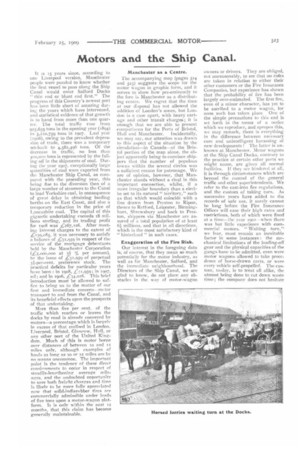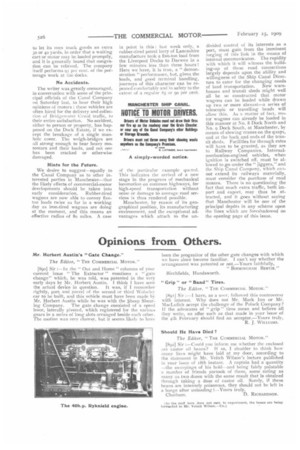Motors and the Ship Canal.
Page 21

Page 24

If you've noticed an error in this article please click here to report it so we can fix it.
Manchester as a Centre. It is 15 years since, according to one Liverpool version, Manchester people were puzzled to know whether the first vessel to pass along the Ship Canal would enter Salford Docks " thin end or blunt end first." The progress of this Country's newest port has been little short of amazing during the years which have intervened, and statistical evidence of that growth is to hand from more than one quarter. The total traffic rose from 925,659 tons in the opening year (1894) to 5,210,759 tons in 1907. Last year ( ioa8), owing to the prevalent depression of trade, there was a temporary set-back to 4,582,496 tons, Of the decrease in traffic, no less than 400,000 tons is represented by the falling off in the shipments of coal. During the year 1907, exceptionally large quantities of coal were exported from the Manchester Ship Canal, as compared with the preceding year, this being due to the diversion then of a large number of steamers to the Canal to load Yorkshire coal, in consequence of great delay in obtaining loading berths on the East Coast, and also a temporary reduction in the price of Lancashire coal. The capital of this gigantic undertaking exceeds 18 millions sterling, and its trading profit for 1908 was 4267,126. After meeting interest charges to the extent of £139,085, it was necessary to satisfy a balance of .31,959 in respect of the service of the mortgage debentures held by the Manchester Corporation (:5,000,00n at 31 % per annum), by the issue of .:31,959 of perpetual 34-per-cent. preference stock. The practical deficits for particular years have been in 1908, ,C.%.,1,959; in 1907, nil: and in 1906, £34,026. This brief introduction must be allowed to suffice to bring us lo the matter of our first and immediate coneern—motor transport to and from the Canal, and its beneficial effects upon the prospects of that undertaking.
More than five per cent, of the traffic which reaches or leaves the docks by road is already conveyed by motors—a percentage which is largely in excess of that realised in London, Liverpool, Bristol, Glasgow, Hull, or any other port of the United Kingdom. Much of this is motor borne over distances of between to and I< miles only, although examples of hauls as long as 30 or 3‹ mites are by no means uncommon. The important point is the tendency of these direct consie-nments to occur in respert of steadily-lengthening average mileages, and the undoubted opportunity to save both freight charges and time is likely to be more fully apnreciated now that solid-indianibber tires are commercially admissible under loads of five tons upon a motor-wagon platform. It is only within the oast 12 months, that this claim has become generally maintainable.
The accompanying map (pages 524 and 525) suggests the scope for the motor wagon in graphic form, and it serves to show how pre-eminently to the fore is Manchester as a distributing centre. We regret that the time at our disposal has not allowed the addition of London's zones, but London is a case apart, with heavy cartage and other transit charges; it is enough that we are able to present comparisons for the Ports of Bristol, Hull and Manchester. Incidentally, we may say, our attention was drawn to this aspect of the situation by the circulation—in Canada—of the Bristol portion of the map alone, the object apparently being to convince shippers that the number of populous towns within the several circles was a sufficient reason for patronage. We are of opinion, however, that Manchester stands without a rival in this important connection, whilst, if a more irregular boundary than a circle be set to its natural" territory," such as that which would coincide with a line drawn from Preston to Ripon, thence to Retford, Leicester, Birmingham, Shrewsbury and back to Preston, shippers via Manchester are assured of a total population of at least 6.1 millions, and that in all directions, which is the most satisfactory kind of " hinterland " in such cases.
Exaggeration of the rire Risk.
Our interest in the foregoing data is, of course, that they mean so much potentially for the motor industry, as well as for Manchester, Salford, and the immediate neighbourhood. The Directors of the Ship Canal, we are glad to know, do not place any obstacles in the way of motor-wagon owners or drivers. They are obliged, not unreasonably, to see that no risks are Laken in relation to either their other customers or the Fire Insurance Companies, but experience has shown that the probability of fire has been largely over-estimated. The first fire, even of a minor character, has yet to be ascribed to a motor wagon,. for none such has taken place. One of the simple precautions to this end is set forth in the terms of a notice which we reproduce, and apropos this, we may remark, there is everything in the difference between necessary care and unintelligent harassing of new developments ! The latter is unknown at Manchester. Motor wagons at the Ship Canal Docks, contrary to the practice at certain other ports we might name, are given all normal facilities. If they are hindered at all, it is through circumstances which are beyond the control of the general traffic and other superintendents. We refer to the cast-iron fire regulations, and the custom of taking turn. As successive years have added to the records of safe use, it surely cannot be long before the Fire Insurance Offices will ease their high rates and restrictions, both of which were fixed at a time—the year 1902—when therewas but little experience with corn-. mercial motors. " Waiting turn," we fear, must remain an inevitable factor in some instances : the mechanical limitations of the loading-off gear and the physical capacities of the gangs have to be admitted, even were motor wagons allowed to take precedence of horse-drawn carts, or were every vehicle self-propelled. The custom, to-day, is to treat all alike, the utmost being done to cut down waste time ; the company does not hesitate to let its men truck goods an extra 30 or 40 yards, in order that a waiting cart or motor may be loaded promptly, and it is generally found that congestion can be relieved. The company itself performs 95 per cent. of the porterage work at the docks.
No Accidents.
The writer was greatly encouraged, in conversation with some of the principal officials of the Canal Company on Saturday last, to hear their high opinions of motors : these vehicles are often hired for the delivery and collection of Bridgewater Canal traffic, to their entire satisfaction. No accident, either to person or property, has happened on the Dock Estate, if we except the breakage of a single manhole cover. The weigh-bridges are all strong enough to bear heavy motorcars and their loads, and not one has been cracked or otherwise damaged.
Hints for the Future.
We desire to suggest—equally to the Canal Company as to other interested parties in Manchester—that the likely effects of commercial-motor developments should be taken into early consideration. Rubber-tired wagons are now able to convey fiveton loads twice as far in a working day as iron-tired wagons are doing at the moment, and this means an effective radius of 8o miles. A case in point is this : last week only, a rubber-tired petrol lorry of Lancashire manufacture took a five-ton load from the Liverpool Docks to Damen in a few minutes less than three hours ! Here we have, it is true, a "demonstration " performance, but, given the loads, and good terminal handling, journeys of this character can be repeated comfortably and in safety to the extent of a regular 85 or 90 per cent.
of the particular example quoted. This indicates the arrival of a new stage in the progress of mechanical locomotion on common highways, for high-speed transportation without noise or damage to average road services is thus rendered possible. Manchester, by reason of its geographical position, its manufacturing environment, and the exceptional advantages which attach to the un divided control of its interests as a port, must gain from the imminent forging of this link in the means of internal communicaton. The rapidity with which it will witness the building-up of these road connections largely depends upon the ability and willingness of the Ship Canal Directors to cater for the changing needs of land transportation. New warehouses and transit sheds might well all be so constructed that motor wagons can be loaded while drawn up two or more abreast—a series of telescopic or travelling heads will allow this. As a matter of fact, motor wagons can already be loaded in this manner at No. 8 Dock North and No. 9 Dock South, at Manchester, by means of slewing cranes on the quays, and at the back and ends of the transit sheds. Facilities for through rates will have to be granted, as they are to Railway Companies. Internalcombustion-engined vehicles, when ignition is switched off, must be allowed to go under the " jiggers," and the Ship Canal Company, which cannot extend its railways materially, must consider the purchase of road motors. There is no questioning the fact that much extra traffic, both impart and export, may thus be attracted, and it goes without saying that Manchester will be one of the principal depots in any scheme upon the lines which are foreshadowed on the opening page of this issue.






























